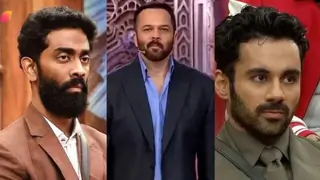| Sometimes, life runs leaping like a wounded cheetah, and leaves its claw-marks here and there, If you connect these marks, you will see a strange pattern. In 1984-85, a gentleman from Amritsar wrote a series of letters to me, claiming that I was the brother he had lost during the partition of India. His name was Iqbal singh and he was a professor at Khalsa College. After receiving a few letters, I wrote to him stating frankly that I was in Delhi with my parents during the partition and that I had lost neither a brother nor a sister. But despite that, Iqbal Singh continued to assert that I had either forgotten the events of my childhood or had never been informed about them. He believed that I was very young when I had been lost while crossing the border in a caravan. It was possible that the people who had rescued me had never told me the truth, or that I was so grateful to them that I refused to accept the truth. I has even informed him that I wasn't a little boy in 1947. I was around eleven years old. But Iqbal Singh wasn't willing to accept my version under any circumstances. I stopped answering his letters. After some time even his letters stopped arriving. About a year later, I received a call from Sai Paranjpe, a film-maker in Bombay. She said that one Harbhajan Singh from Delhi wanted to come to Bombay to meet me. She didn't give me a reason, but rather unexpectedly, began to ask me some strange question about me past.
"Where were you during the partition?"
"In Delhi," I replied. "Why?"
"Just like that." Sai speaks Urdu fluently and well, but she asked me in English, "And your parents?"
"In Delhi. I was with them. Why?" She continued to talk to me for some time, but I felt that she was using English to cover-up something because she always talked to me in Urdu, though she called in Hindi. But after a while, she couldn't contain herself, and said, "Look here, Gulzar. It's like this. I am not supposed to tell you, but there is a gentleman in Delhi who claims that you are the son he had lost during the partition." That was a new story! Nearly a month later, Amol Palekar, the famous actor in Bombay, called me said, "Mrs. Dandavate wants to talk to you. She is in Delhi." "Who is Mrs. Dandavate?" I asked. "The wife of the ex-Finance Minister in the Janata Government, Madhu Dandavate." "Why?" "I don't know. When and where can she call you?" I had never had any dealings with either Mr. or Mrs. Dandavate. I had never met them. I was surprised. I gave Amol Palekar the telephone numbers of both my office and my home. The story had begun to take strange turns. I didn't know that it was a part of Sai's story. Amol is a good actor and he played his part well and did not reveal the real reason for his call. I am convinced, however, that he knew the story. A Few days later, Pramila Dandavate called. She told me that one Sardar Harbhajan singh wanted to come to Bombay to meet me. He thought that I was the son he had lost during the partition. It was the month of November. I remember that. I told her that I would be in Delhi from January 10 onwards to attend the international film festival and would meet Sardar Harbhajan Singh. She shouldn't send him to Bombay. I then asked her who Sardar Harbhajan Singh was. She told me that during the Janata regime, he had been the minister for Civil supplies in Punjab. I went to Delhi in January. I booked a room in Ashoka Hotel. Someone called from Sardar Harbhajan Singh's place to find our when he could meet me. By then I had figured out that he was a very trustworthy old man. The one who had called was his son. Courteously, I suggested, "I please, let him not trouble him self. If you can come here tomorrow afternoon, I'll go with you meet him as his house." I was surprised to learn that both Sai and Amol Palekar were also in Delhi and that they knew about my appointment for the following day. The person who came to pick me up the next day was Sardar Harbhajan Singh's eldest son. His name was Iqbal Singh. Punjabis do not grow old even at an advanced age. When I came face to face with Harbhajan singh, he got up to receive me with great affection. Like a son, I touched his feet, He introduced me to my 'mother'. "Son, she is your mother…….." I touched Ma's feet, too, like a son. His sons called him Darji. His second son, his daughters-in-law, grandchildren-were all present. His was a big, well-to-do, family. The house was large and spacious, Punjabis not only build big and open houses, they also have large and open hearts. After we had talked about all sorts of things, some snacks and drinks were served. Then Darji told me when and how they had lost me. "The riots were terrible. Everything a around us was on fire-and rumours added fuel to the flames. But we refused to leave. The Zamindar was a Muslim and a friend of my father's. He was also grateful to us for favours in the past. Everyone in the qasbah knew that as long as he was around no one could even knock at our door, His son used to study with me in school (I think, he said the boy's name was Ayaz). But whenever caravans of refugees passed through our qasbah, we lost heart. We began to tremble with fear. The Zamindar came every morning and evening. And he never failed to comfort us and instill courage in our hearts. He treated my wife like his own daughter. But one day, when a caravan passed through cursing and shouting slogans, we spent the entire night standing on the roof-top to watch it- not only us, but the entire qasbah. I don't know why, but we felt as if it was the last caravan. We should leave with it. Nothing would survive after that. We betrayed the trust of our friend, the Zamindar, and left. "He used to tell us, 'come and live in my haveli. Lock up your house for a few days. No one will touch it'. But we pretended to be confident and brave, inwardly, however, we were terrified, to tell you the truth, sampooran kaka, our faith had been shattered, our roots had been shaken. All the caravans passed through our place, we had heard that if we entered Jammu via Mianwalli, we would get help from the army to go down the rest of the way. We left our house unlocked. The truth is that in our hearts we knew the time to leave our land had arrived. We decided to pick up our things and escape. With two grown -up sons, a daughter (eight or nine years old) and you. You were the youngest. We had to walk for two days to reach Mianwalli. We always found something to eat in the villages we passed through. There were riots everywhere. Gangs of rioters always came from outside, the caravan had grown very large by the time it reached Minwalli. People came from all direction to join it. Son, the presence of others, who had suffered like us, gave some strength. We reached Mianwalli at night. During our journey, we often lost sight of our children and called out to them in anguished despair. There were other like us, and there was always a lot of crying and screaming. " That night, I don't know how the rumour spread that the caravan at Mianwall was going to be attacked. That a large mob of Muslims was on its way - one could sense fear and terror in the silence. All of us left that very night." Then Darji said very quietly, " It was during that night that we lost both our youngest children. I don't know how. If we had known…. He left the sentence unfinished and fell silent. I don't clearly remember, but I think his sons and daughters in law got up and the others present shifted uncomfortably in their places. Darji continued his narrative. "Once we got to Jammu, we waited for a long time. We searched one camp after another and watched every caravan that arrived. There were thousands of people. Some joined caravans going to Punjab, others went down the hills to places where they had relatives. We gave up hope and went to Punjab. We continued to search the camps there. All we could do was to search. The children were lost and we abandoned all hope. " About twenty or twenty two years later, a group of pilgrims were scheduled to go to Pakistan from Hindustan. I suddenly felt like making a journey to Gurudwara Punjab Sahib. I also wanted to see our old home, but my wife always broke down at the very thought. " We also couldn't overcome our sense of guilt at the fact that we hadn't trusted our Zamindar. Whenever we thought of him, we felt ashamed of ourselves. "Anyway, we finally decided to go. Hut before leaving, I wrote a letter to the Zamindar and another to his son. Ayaz. I even asked them to forgive us for having deceived them. I told them about the reasons for our hijrat. Sent the information about family and also told them about our lost children, Satya and Sampoorn. My hope was that even if ayaz didn't remember us. The Zamindar, ajzal, couldn't have forgotten us. I didn't post the letters here, because I thought I would post them once I got across the border. We were planning to be in Pakistan for twenty or twenty-five days, and I was sure that if chacha afzal wanted to meet us, he would send a reply. If he invited us, we would go, otherwise - what was the use of digging up old graves? What could be gained by doing that? Harbhajan singhji took a deep breath and continued. "Those letters remained in my pocket, Punniji- I, some how, lost heart. But the day I returned via karachi, I don't know that made me post the letters. "I waited for a reply, even though I didn't think I would receive one, and after a few months had gone by, I gave up all gope. "I got a reply after eight years." "From afzal chacha?" I asked in surprise. He didn't reply. I asked again, "From ayaz?" He nodded and exclaimed sadly, "yes! In response to my letter. It was from his letter that I learnt that afzal chacha had passed away a few years after the partition. Ayaz had look after the land after afzal chacha,s death. Ayaz too died recently. It was when his papers were being examined that my letters were discovered. When one of the persons who had come to stay with the bereaved family read out the letter, someone information those who were gathered there that the girl mentioned in the letter was present in the house at the moment and had come to offer her condolences from Mianwalli. When she was questioned, she told them that her real name was Satya. She had been separated from her parents during the partition. Now she was called dilshad." Ma's eyes were still dry, but darji's voice was tearful. "I called upon Waheguru and left that very day. I met dilshed at Afzal chacha's house. And you know, she remembered everything. But she didn't remember her own house. I asked her how she had got lost? How she had got separated from us? She said, 'I got tried of walking. I was very sleep. I saw a tandoor in a courtyard and went to sleep next to it. When I woke up, I saw that no one was around . I would look for you all day and go back to the tandoor to sleep. When the owners of the house came back three days later, they woke me up. Husband and wife. They let me stay there in the hope that someone would come looking for me. But no one came. I stayed there like a servant. They fed me and gave me clothes. They looked after me well and then after many years, maybe either or nine years later, the master of the house married me. By the grace of Allah, I have two sons. One is in the Pakistani Air Force and the other has a job in a good firm in Karachi.' Writers are in the habit of asking a few questions, which are not always necessary.' "Wasn't she surprised to see you? To meet you? Didn't she cry?". "No. she was surprised, but wasn't too upset," Darji replied. "In fact, whenever I think about her, I see her smiling repeatedly at us, as if I had gone there to tell her a story. She didn't seem to feel that we were her parents." "And Sampooran? Wasn't he with her?" "No, she didn't even remember him." Ma, once again, repeated what she had said a few times earlier during her husband's narrative, "Punni (Sampooran), why don't you believe us? Why do you want to hide from us? You have even changed you name to Gulzar. Just as Satya's name was changed to Dilshad." After a pause, she continued, "Who gave you the name Gulzar? You name is Sampooran Singh." I asked Darji, "Who told you about me? How did it occur to you that I am your son?" "It's like this, son. When we found our daughter, by the grace of Waheguru, after thirty years, we began to hope that He would help us find our son too. Iqbal read an interview of yours in some paper and told us that you real name is Sampooran Singh and that you were born over there, in Pakistan. It was that which persuaded us to look for you. Yes, I forgot to tell you that my son was given the name Iqbal by Afzal Chacha." Ma said, "Kaka, you continue to live where you want. It doesn't matter if you have converted to Islam, but please accept the fact you are my son, Punni," I repeated, once more, the history of my family and left them feeling hopeless. The story I have recorded happened about either years ago Now it's 1993. After either years now, I suddenly received a letter from Iqbal, along with a card for a Bhog ceremony announcing that Sardar Harbhajan Singhji had passed away. Ma, he said, wanted him to inform her youngest son. I felt as if my own Darji had passed away. |

























